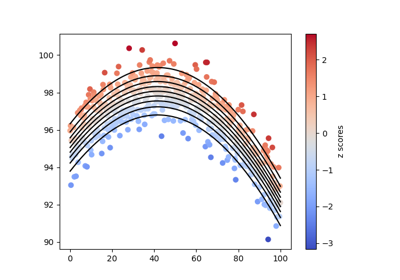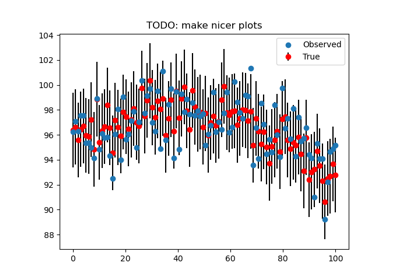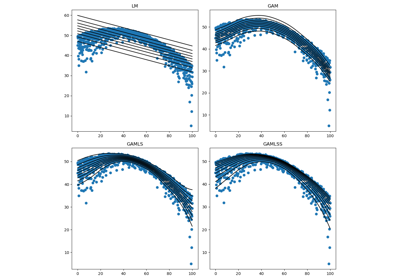NormodOLS#
- class sknormod.NormodOLS(*, fit_intercept=True, copy_X=True, n_jobs=None, positive=False)#
Normod in OLS. Fits a homoskedastic Gaussian using ordinary least squares. It is just scikit-learn LinearRegression, so the parameters are the same as to LinearRegression, but the fitted model is DistributionalRegressor, i.e., it has methods to get centiles or z-scores etc.
- Parameters:
- fit_interceptbool, default=True
Whether to calculate the intercept for this model. If set to False, no intercept will be used in calculations.
- copy_Xbool, default=True
Whether to copy the input data; if False, it may be overwritten.
- n_jobsint or None, default=None
The number of jobs to use for the computation. None means 1 unless in a joblib.parallel_backend context. -1 means using all processors.
- positivebool, default=False
When set to True, forces the coefficients to be positive.
Examples
>>> from sknormod.base import NormodOLS >>> import numpy as np >>> X = np.arange(100).reshape(100, 1) >>> y = np.zeros((100, )) >>> normod = NormodOLS() >>> normod.fit(X, y) NormodOLS()
Methods
fit(X, y)Fit linear model.
Get metadata routing of this object.
get_params([deep])Get parameters for this estimator.
predict_distr_p(X, p)Predict the percentiles of the distribution.
Predict distribution parameters for given input samples.
score(X, y)Compute the logarithmic score of the predicted distribution parameters against the true values.
set_params(**params)Set the parameters of this estimator.
transform_to_p(X, y)Transform the target values to percentiles.
transform_to_z(X, y)Transform the target values to z-scores.
- fit(X, y)#
Fit linear model.
- Parameters:
- Xarray-like or sparse matrix of shape (n_samples, n_features)
Training data.
- yarray-like of shape (n_samples,)
Target values.
- Returns:
- selfobject
Fitted estimator.
- get_metadata_routing()#
Get metadata routing of this object.
Please check User Guide on how the routing mechanism works.
- Returns:
- routingMetadataRequest
A
MetadataRequestencapsulating routing information.
- get_params(deep=True)#
Get parameters for this estimator.
- Parameters:
- deepbool, default=True
If True, will return the parameters for this estimator and contained subobjects that are estimators.
- Returns:
- paramsdict
Parameter names mapped to their values.
- predict_distr_p(X, p)#
Predict the percentiles of the distribution.
- Parameters:
- Xarray-like or sparse matrix of shape (n_samples, n_features)
The input samples.
- parray-like of shape (n_percentiles,)
The percentiles to predict.
- Returns:
- percentileslist of floats
The predicted percentiles.
- predict_distr_params(X)#
Predict distribution parameters for given input samples.
- Parameters:
- Xarray-like or sparse matrix of shape (n_samples, n_features)
Input samples.
- Returns:
- paramsarray-like of shape (n_samples, 2)
Predicted distribution parameters where each row represents [mu, sigma].
- score(X, y)#
Compute the logarithmic score of the predicted distribution parameters against the true values.
- set_params(**params)#
Set the parameters of this estimator.
The method works on simple estimators as well as on nested objects (such as
Pipeline). The latter have parameters of the form<component>__<parameter>so that it’s possible to update each component of a nested object.- Parameters:
- **paramsdict
Estimator parameters.
- Returns:
- selfestimator instance
Estimator instance.
- transform_to_p(X, y)#
Transform the target values to percentiles.
- transform_to_z(X, y)#
Transform the target values to z-scores.


